Top Reasons Why Solar Pool Heating Is a Better Option
Article posted by Gregory Grochola (physicist) on 13th Feb 2019
Solar pool heating has always been a popular option in Australia. With ever-increasing energy costs, they are more than ever the smartest choice today - especially considering the many design refinements modern systems have gone through over 50 years. Solar pool heating is a unique proposition, and the best heating option one can invest in - and not just from an environmental perspective. So if you're looking for reasons to go solar here are the top 6 reasons:
- They make financial sense - solar pool heaters are the best investment you'll make
- Excellent reliability - with only a single moving part solar pool heaters are very reliable
- You may actually get more pool use with solar than with auxiliary heating
- Lower maintenance - solar pool heaters have very little parts that can breakdown
- Combine synergistically with pool covers to boost temperatures up to 10°C
- Ergonomic - they do not take up backyard space, have no gaseous and little noise emissions
- Environmental reasons - in this day and age they are the most responsible choice
1. Makes Financial Sense

Pool Heating Running Costs
Solar pool heating systems are hands down the least expensive and most efficient way to heat a pool, with COP factors up to 150 for the newer generation of open channel fast flow collectors, compared to heat pumps which top out at about a COP factor of 5. A COP factor is the ratio of Energy Out to Energy In. So even for a highly "efficient" heat pump for every 1 kWh you put in you'd only get 5 kWh worth of heat out. Compare this to a solar heating system which can give you 150 kWh of heat for every 1 kWh you put for the best collectors, but more typically 50-100 kWh.
A COP factor of only 5 is like putting an inefficient bar heater on 1/5th of your pool. Let's say you have a 50,000L pool, would you agree to heat 10,000L of it with a bar heater on daytime tariffs, if it meant the rest of the 40,000L is heated free? Well no, I wouldn't, because heating even a "mere" 10,000L of outdoor, uninsulated pool water using a bar heater is terribly inefficient. But that's exactly the proposition of even the most "efficient" heat pumps out there.
To get an accurate assessment of auxiliary heater running costs, try our free interactive online pool heating simulator here, where you can simulate pool temperatures in the capitals Hobart, Melbourne, Canberra, Adelaide, Sydney, Perth, Brisbane and Darwin.
Initial System Cost
In terms of system and installation costs, these usually pay for themselves within 1 to 5 years depending on whether or not you DIY with a solar pool heating kit or have one installed for you and what you're offsetting as a pool heating unit. Even if you don't have the roof space on an ideal aspect, our analysis here shows solar pool heating collectors can be installed using a wide range of install angles without losing too much heating loss efficiency.
2. Ultimate Reliability
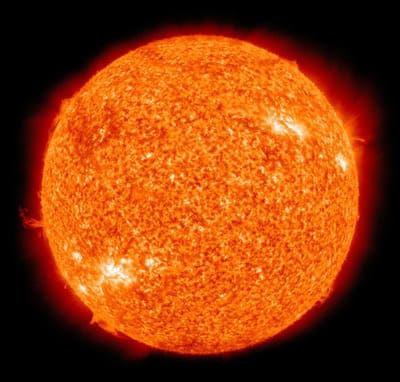
Solar pool heating systems are a mature and widely accepted technology for a reason; they work - as sure as the sun shines, for over 50 years they have been powering heat into Aussie pools for generations and are only getting better with newer designs and refinement in UV stabilisers and materials. The only moving component is a pool pump which can easily be replaced by the owner if it goes.
Solar Pool Heating Systems
HDPE OKU panels are so reliable, for example, that we decided to back them up with a 35 Year warranty, that's how confident we are. Even newer generation PVC tube collectors, when looked after in terms of low pressure and alkaline pH will last a minimum of 15 years, try getting that kind of life out of a heat pump or gas heater. Only passive heat saving measures such as wind sheltering can top them in terms of reliability.
Pool Covers Can Increase Reliability
It's commonly argued that auxiliary heaters are "on demand" while of course, solar pool heaters rely on the sunny weather for best results. However, due to the large thermal mass of the pool and surrounding ground, a couple of days of cloudy weather with the pool under a cover will not bring temperatures back to that with no solar, not by any means. It would take a week with no solar input at all for that. Which means you only need a day or two of sunny weather to bring it right back up. Secondly, no one but the most hardened of souls will want to swim when it's cold out anyway. These two facts mitigate somewhat the whole "on-demand" argument for auxiliary heaters. If you want a more "on-demand" system from solar, just size it up and use a blanket, and there will not be many days when you can't swim during an extended pool season.
7. You May Actually Get More Use From Your Pool With Solar and a Cover
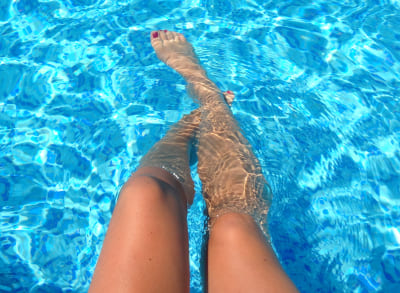
4. Lower Maintenance
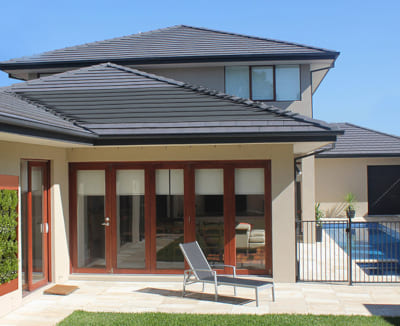
Solar pool heating systems are extremely reliable with relatively low maintenance. When properly installed, with low working pressures, a good strainer for the PVC tube style collectors, and with proper maintenance of pool water pH by the owner; there is no reason a pool heating system will not last well past its warranty period.
OKU panels are exceptional, in this regard - but even PVC tubes will provide years of trouble-free service; when chosen for the right areas, i.e. cockatoo free zones, and looked after with the above measures.
Auxiliary Pool Heaters
With auxiliary heaters, apart from high running costs, you're looking at fixed and costly maintenance scheduled by qualified maintenance engineers just to keep the unit running at an acceptable efficiency and on top of that, you have unit replacement costs every 10 or so years depending on the quality and cost of the unit you install.
5. They Combine Well With a Pool Cover Blanket
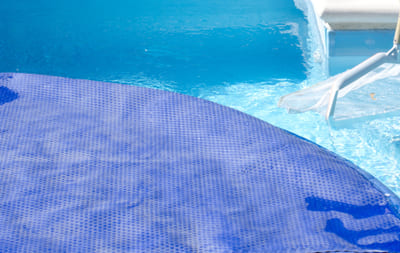
As good solar pool heating systems are when combined with a solar cover blanket they are even better. Why? Because solar puts the heat in while a solar cover keeps it in overnight. Depending on your pool heat loss specifics, especially if you've got any shading on your pool, a cover might not do all that much by itself in the way of heating your pool. But when combined with a solar pool heating system, the two work synergistically to heat and to keep your pool warm well into shoulder months. A well-sized pool heating system with a solar cover can easily heat a pool by up to 10°C in the shoulder months.
The combination almost matches the on-demand aspect of auxiliary heating, in that the boost in temperature it's so effective that for the bulk of the shoulder season extension months there may only be a few days of consecutive cold weather where solar heating + a pool blanket will not be enough to heat your pool.
6. Do Not Take Up Backyard Space - No Gaseous and Little Noise Emissions
A solar pool heater does not have any gas emissions, do not take up backyard space and has low noise levels.
Gas Heaters
Gas heaters will need a dedicated backyard area with some clearance around the bulky units. While reasonably quite, a gas heater needs a flue and will emit high temperature exhaust fumes which contain, nitrogen dioxide (NO2), carbon monoxide (CO), and formaldehyde (HCHO) as well as fine 1- 2.5 micrometres particles. These are potentially harmful when they enter the bloodstream through the lungs. As such, some thought needs to go into the placement of a gas heater to make sure the vast majority of this polluted air gets cleared with the wind. Placement of a gas heater should preferably be in a well open area away from buildings. Any eddies above the unit which delay the clearance of this spent air can bring some of this air back down into the backyard after it cools depending on the wind direction. Just because you can't see it doesn't necessarily mean you're not breathing it. If you've ever cooked on a BBQ you'll know that clearing hot smokey air is not all that easy, again depending on the wind direction.
Heat Pump Heaters
Heat pumps will also need a dedicated area with good building clearance. They can get noisy depending on the quality of the unit, which limits their ability to run at night on cheaper tariffs. Some people don't realise that unlike gas heaters that emit hot, polluted air; heat pumps emit cold air, albeit unpolluted. This is because heat pumps work by drawing warmth from the air and transferring it into the pool water. However, cold air falls and if there is little wind outside or if the unit is inappropriately situated; "spent" cold air clearance can be even more of an issue then with a gas heater. Most better units will eject air directly upwards which is preferred to side air ejecting units. Cold air that falls back down to ground level will cool the surrounding air around your pool, which is definitely not what you want in the shoulder months - but worse still this spent air will partly short circuit the heat pump leading to inefficiencies and even higher running cost, especially if the unit is placed in a relatively confined space. So again some thought needs to go into the placement of these units.
3. Environmental Reasons
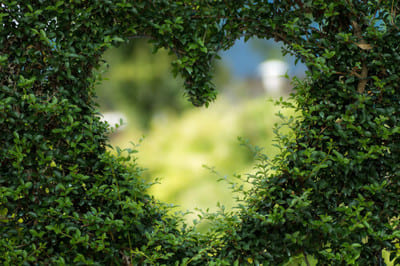
Solar energy is a renewable source of never-ending power. You're not burning fossil fuels to create heat, it doesn't use much electricity, all the heat that is harnessed is direct from the sun. Needless to say solar is the best option when it comes to the environment, with the lowest energy usage and greenhouse gas emissions of any pool heating system.
With climate change fast upon us, it's time we got serious about lowering our greenhouse gas emissions. Cutting emissions don't even have to impact our lifestyles or inconvenience us, we just have to make smart and informed buying decisions.
Using a solar pool heater instead of a gas or heat pump helps to greatly reduce carbon dioxide emissions, which slows global warming and climate change for the next generation. Some pool heaters are even recyclable, look for the recycle mark stamped directly on the collector.
If you enjoyed this article please share, it'll help us get the word out about solar and renewables :)

